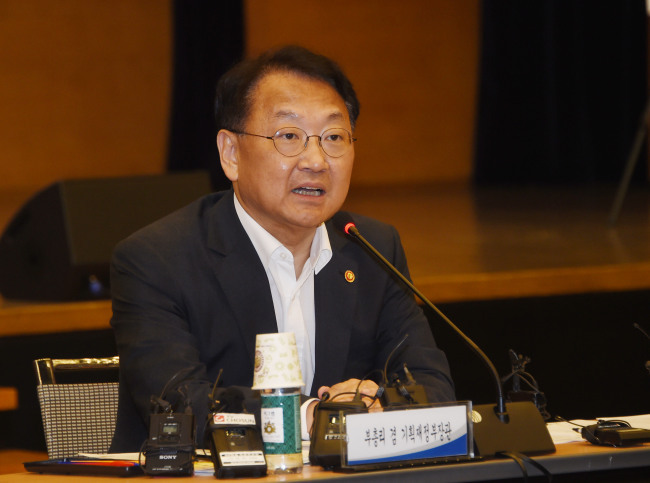[THE INVESTOR] South Korea’s Finance Minister Yoo Il-ho said over the weekend there is “more room” to use monetary policy at the central bank and partly admitted that lower interest rates led to a rise in household debt.
His comments came as the Bank of Korea is to decide its key rate on Thursday this week amid weak exports, slow manufacturing production and growing household debt.
Although Yoo said he was “not in a position” to say if a lower rate is necessary, “theoretically there is room to use more monetary policy,” he told Bloomberg while attending a conference of the World Bank and the International Monetary Fund in Washington.
“There’s some truth to the fact lower interest rates led to a rise in household debt, but in terms of size and quality, household debt is still manageable at this point,” he said.
His comments came as the Bank of Korea is to decide its key rate on Thursday this week amid weak exports, slow manufacturing production and growing household debt.
Although Yoo said he was “not in a position” to say if a lower rate is necessary, “theoretically there is room to use more monetary policy,” he told Bloomberg while attending a conference of the World Bank and the International Monetary Fund in Washington.
“There’s some truth to the fact lower interest rates led to a rise in household debt, but in terms of size and quality, household debt is still manageable at this point,” he said.

Ballooning household debt has been the key issue at the recent parliamentary audit here on the government’s economic policy. The volume of household debt surged to 1,257.3 trillion won ($1.127 trillion) as of the end of June this year from 1,019 trillion won at the end of 2013, according to BOK data, since the 2014 expansionary policies have prompted people to borrow cheaper money for housing.
The BOK has kept its base policy rate unchanged at an all-time-low of 1.25 percent since June, worrying that easing money could exacerbate the household debt problem.
Economists expected that the BOK would take a wait-and-see approach this week and likely freeze the rate, citing the high possibility of a US rate hike in December.
“With household debt still regarded as a burden and a US rate hike being imminent, expectations for a further rate cut will subside,” said Kim Yu-kyum, economist at LIG Investment & Securities, in a report.
Another analyst Kim Yoo-mi of BNK Securities said: “Seeing a slower growth in the near future, the BOK will find it difficult to change its monetary policy stance given the upcoming US election in November and a Federal Reserve’s rate hike in December.”
Korea’s overall economic recovery has been slow on weak exports and manufacturing production, while moderate growth of domestic demand was led by construction investment, the state-run Korea Development Institute said in a report Sunday.
Exports fell 5.9 percent in September year-on-year, reversing August’s 2.6 percent growth, mainly due to losses in wireless communication devices and strikes at carmakers, the KDI said.
Retail sales jumped 6 percent in August from a year earlier, expanding from a 4.4-percent gain in July, on a sharp rise in demand for home appliances and foods amid the sweltering summer heat and the Chuseok holiday in September, it said.
Construction was the only sector that showed high growth. The value of construction completed had a 23.6 percent growth in August, rising from 19.8 percent a month earlier.
Meanwhile, Yoo said during the Bloomberg interview that if the US presidential candidate Donald Trump takes office at the White House, it is unlikely that he would carry out all of his campaign pledges including renegotiation of the 2012 US-South Korea free trade agreement.
Regardless of whether Trump or his opponent Hillary Clinton win, Yoo said South Korea will maximize its use of the FTA or the WTO processes as well as the Group of 20 forum to ease trade protectionist moves.
“While we won’t be able to maintain everything as is, an agreement is an agreement,” Yoo told Bloomberg.
While in Washington on Saturday, Yoo held a meeting with senior officials from global ratings agencies, who said the South Korean economy has a degree of policy space to deal with and contains geopolitical and domestic risks that include household debts, according to Seoul officials.
Yoo talked with officials from Moody‘s, Standard and Poor’s and Fitch.
Standard & Poor’s raised its credit rating of the Korean economy to “AA” from “AA-” in August.
Moody‘s upgraded South Korea’s rating to “Aa2” from “Aa3” in December last year, while Fitch has reaffirmed South Korea‘s rating at “AA-.”
By Kim Yoon-mi/The Korea Herald (yoonmi@heraldcorp.com)







![[Graphic News] More Koreans say they plan long-distance trips this year](http://res.heraldm.com/phpwas/restmb_idxmake.php?idx=644&simg=/content/image/2024/04/17/20240417050828_0.gif&u=)
![[KH Explains] Hyundai's full hybrid edge to pay off amid slow transition to pure EVs](http://res.heraldm.com/phpwas/restmb_idxmake.php?idx=644&simg=/content/image/2024/04/18/20240418050645_0.jpg&u=20240419100350)





![[From the Scene] Monks, Buddhists hail return of remains of Buddhas](http://res.heraldm.com/phpwas/restmb_idxmake.php?idx=652&simg=/content/image/2024/04/19/20240419050617_0.jpg&u=20240419175937)

![[KH Explains] Hyundai's full hybrid edge to pay off amid slow transition to pure EVs](http://res.heraldm.com/phpwas/restmb_idxmake.php?idx=652&simg=/content/image/2024/04/18/20240418050645_0.jpg&u=20240419100350)

![[Today’s K-pop] Illit drops debut single remix](http://res.heraldm.com/phpwas/restmb_idxmake.php?idx=642&simg=/content/image/2024/04/19/20240419050612_0.jpg&u=)